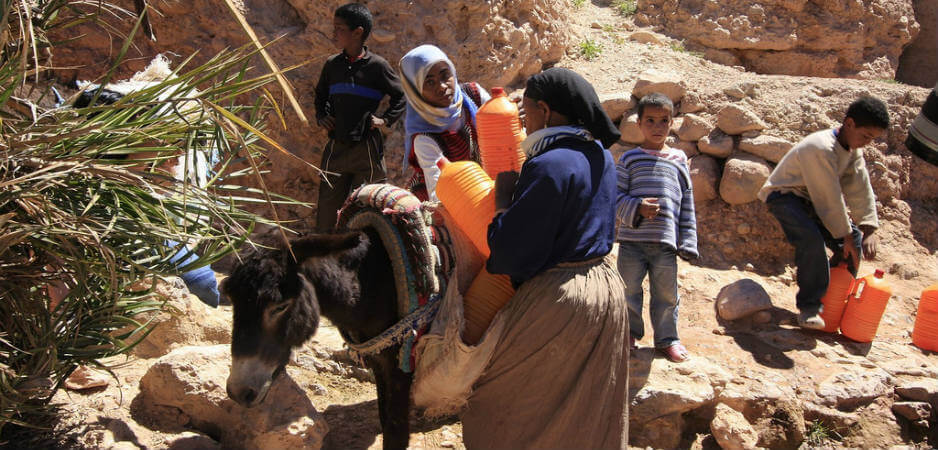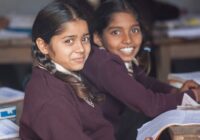Fog harvesting provides an alternative source of drinking water in places that are cloud abundant and infrastructure poor.
In 2006, the Dar Si Hmad Foundation and the University of La Laguna began investigating the viability of obtaining drinking water from fog in southwest Morocco. Researchers chose Mt. Boutmezguida as a testing ground for its ideal climatic conditions. The project subsequently attracted support from FogQuest, a Canadian nongovernmental organization that developed and installed 20 fog-water collection units. In 2011, Dar Si Hmad expanded the project after winning Munich Re Foundation’s call to tender for 2011-12 Fog Net funding.
With the support of Munich Re Foundation, researchers from the Technical University of Munich began monitoring a new generation of fog nets. Testing to optimize their design began in November 2013, while construction was underway to connect the previous generation of fog nets to five villages. The project was officially inaugurated in March 2015, when pipes began carrying water into the homes of people in participating villages.
The project achieved its main goal to provide potable water to five rural communities. In the future, additional piping and fog nets will be installed to supply more villages. A key question to consider is the extent to which the project met its other reported goal to reduce women and children’s water-gathering chores and thereby enable girls to regularly attend school. Self-reporting on this project and external assessments could have provided more evidence to show that a reduction in water-gathering chores empowers women and girls.
Project Outputs: Empowering Women?
There are no case-specific evaluations to support the argument that reducing water gathering responsibilities increases girls’ enrollment in school. In the past, women and girls spent about four hours per day retrieving water. Still, a redistribution of labor responsibilities surrounding the collection of water can shift existing power structures without significantly increasing girls’ enrollment in school.
This is due to the gendered structure of labor within participating households. Men typically leave home to engage in income-generating activities, while women stay at home to manage domestic responsibilities or seek out limited income-generating opportunities at local cooperatives. Within these communities, domestic responsibilities fall almost exclusively on women because men move to bigger towns in search of jobs.
Even if women and girls are able to attain higher levels of education and generate more wealth, the project lacks a vision for helping women balance new responsibilities with unpaid domestic labor. While development projects celebrate women’s integration into the formal economy, they are generally indifferent to the ways in which this process leads to inequitable outcomes. Whether the fog harvesting project will buck this trend and encourage a more equitable distribution of labor is open to question.
Unforeseen Outcomes
Although Dar Si Hmad spearheaded the project, it unfolded as a collaborative effort, attracting several partners over a decade of research, testing and community outreach. One of the unforeseen outcomes of these partnerships was the development of a more efficient generation of fog nets. Likewise, unforeseen collaborations expanded the project’s budget and timeline.
In 2015, Dar Si Hmad received a $59,770 grant from USAID for environmental development. This exceeds the expense of phase one fog harvesting nets, which cost $200 per unit. During phase one, 20 units were installed. Therefore, the cost of phase one was at least $4,000, plus the cost of piping, labor and permits.
Data from phase one shows that 20 fog catchers produce 6,300 liters of fresh water per day. Estimating along average weather patterns for the region, researchers predict that the project will yield 2.3 million liters of water per year. That is enough to support around 400 residents, or the number of year-round residents in the five participating villages.
Another unforeseen outcome was a collaborative project led by visiting researcher Leslie Dodson. She worked with women in participating villages to develop “fog phones.” This technology allows beneficiaries to report maintenance needs to project managers using standardized codes. Women learn to operate their phones through literacy and numeracy workshops. By linking beneficiaries to project managers, fog phones create a feedback channel that facilitates water monitoring tasks.
Dodson argues that this technology allows women to take on “infomediary” roles without challenging cultural norms. The availability of channels for women to participate in the management of water is an example of how the project tries to mitigate its disruptive effects on established water management patterns.
Assessment and Recommendations
Despite the lack of evidence of women’s empowerment, it continues to shape the narrative that captures the international community’s attention. On the other hand, the project partners were much better at documenting and measuring outcomes related to meeting the water consumption needs of participating communities.
In order to meet this goal, project partners undertook community outreach, research and testing activities for a decade. This long period of engagement allowed for trust building; experimentation with different generations of fog collectors; data collection through household surveys; and the creation of educational programming and participatory mechanisms.
The climate, involvement of beneficiaries and long-term commitment of multiple partners supported the project’s success. The major limitation of this project is that the particular climate and social ecology that enabled its success are difficult to replicate elsewhere. Therefore, the fog harvesting project seems difficult to scale up without compromising its community oriented approach.
One way to increase the project’s effectiveness in existing locations is with greywater recycling systems. Using water that has been lightly dirtied through household consumption, this process uses a filtration system to make used water safe for non-drinking purposes, such as irrigating small farms. Currently, the water delivered to participating households is quickly consumed. Researchers have investigated the possibility of installing greywater recycling in participating households to further stretch the project’s impact.
Sustainable Development and Politics
A major critique of this project is its framing of vulnerability in terms of increasing cycles of drought, rain scarcity and low aquifer replenishment rates. There is no acknowledgement of the political processes that have marginalized rural populations and deprived them of their right to subsistence. By depoliticizing the struggle of rural populations and creating an official narrative around climate change, technology and women’s empowerment, this project obscures social realities and contributes to the image of Morocco as a defender of environmental justice and women’s rights.
 A more political project would address the history of colonial and postcolonial land governance. Moreover, it would consider the state’s role in eroding collective land ownership through privatization schemes. Finally, it would shed light on confrontations over private and public interests, and be critical of how participatory approaches create new opportunities for control and management.
A more political project would address the history of colonial and postcolonial land governance. Moreover, it would consider the state’s role in eroding collective land ownership through privatization schemes. Finally, it would shed light on confrontations over private and public interests, and be critical of how participatory approaches create new opportunities for control and management.
A historical perspective raises questions about the future management of the fog harvesting project. To not reckon with this historical context is to cut off potential future solutions. What will happen if this previously marginalized land becomes revitalized through fog water? Who will lay claim to it, and how will local communities defend their rights? If the state does implement similar projects, will it draw on its own version of participatory development that uses consultations to inform populations rather than seek approval and build trust? Dar Si Hmad and its partners do not address these questions. The failure to do so risks excluding local communities from decision-making processes in the future.
The views expressed in this article are the author’s own and do not necessarily reflect Fair Observer’s editorial policy.
Photo Credit: Alik Shahaf
Support Fair Observer
We rely on your support for our independence, diversity and quality.
For more than 10 years, Fair Observer has been free, fair and independent. No billionaire owns us, no advertisers control us. We are a reader-supported nonprofit. Unlike many other publications, we keep our content free for readers regardless of where they live or whether they can afford to pay. We have no paywalls and no ads.
In the post-truth era of fake news, echo chambers and filter bubbles, we publish a plurality of perspectives from around the world. Anyone can publish with us, but everyone goes through a rigorous editorial process. So, you get fact-checked, well-reasoned content instead of noise.
We publish 3,000+ voices from 90+ countries. We also conduct education and training programs
on subjects ranging from digital media and journalism to writing and critical thinking. This
doesn’t come cheap. Servers, editors, trainers and web developers cost
money.
Please consider supporting us on a regular basis as a recurring donor or a
sustaining member.
Will you support FO’s journalism?
We rely on your support for our independence, diversity and quality.








Commenting Guidelines
Please read our commenting guidelines before commenting.
1. Be Respectful: Please be polite to the author. Avoid hostility. The whole point of Fair Observer is openness to different perspectives from perspectives from around the world.
2. Comment Thoughtfully: Please be relevant and constructive. We do not allow personal attacks, disinformation or trolling. We will remove hate speech or incitement.
3. Contribute Usefully: Add something of value — a point of view, an argument, a personal experience or a relevant link if you are citing statistics and key facts.
Please agree to the guidelines before proceeding.